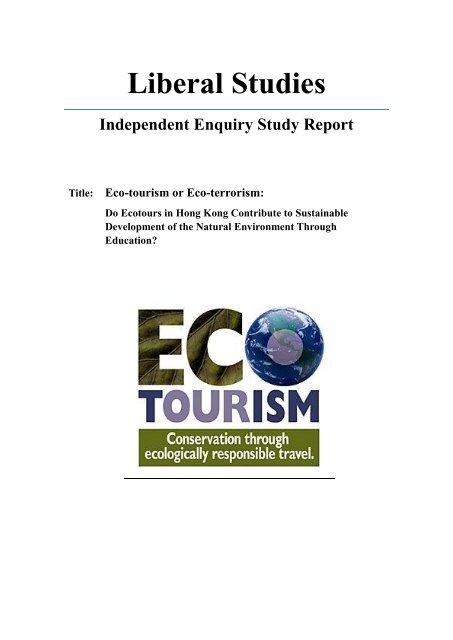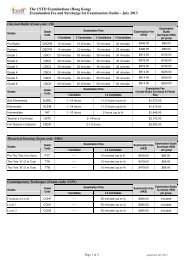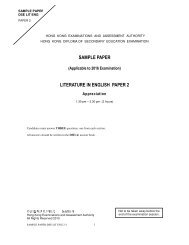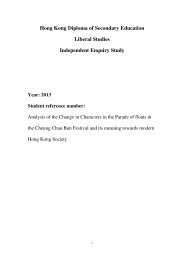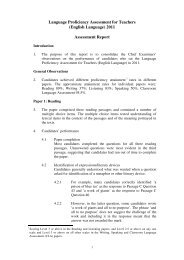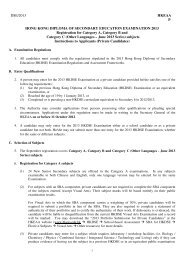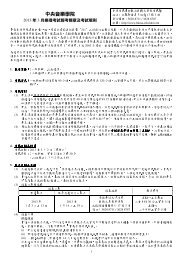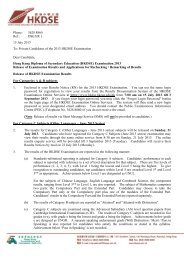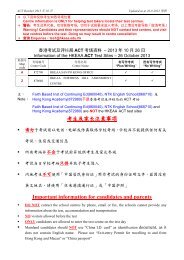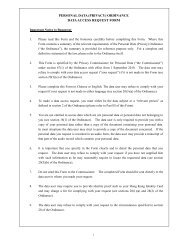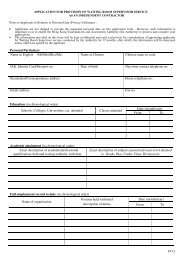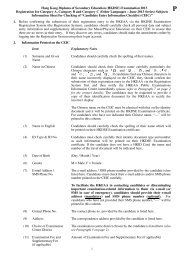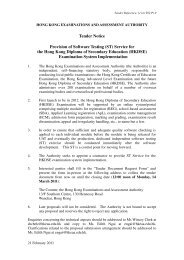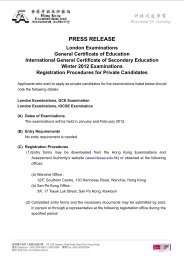Liberal Studies- Independent Enquiry Study Report
Liberal Studies- Independent Enquiry Study Report
Liberal Studies- Independent Enquiry Study Report
Create successful ePaper yourself
Turn your PDF publications into a flip-book with our unique Google optimized e-Paper software.
<strong>Liberal</strong> <strong>Studies</strong><strong>Independent</strong> <strong>Enquiry</strong> <strong>Study</strong> <strong>Report</strong>Title:Eco-tourism or Eco-terrorism:Do Ecotours in Hong Kong Contribute to SustainableDevelopment of the Natural Environment ThroughEducation?School: Belilios Public SchoolName: Cheng Lok YiClass: 5H (3)Date: July 16, 2012
Table of Contents1. Introduction 32. Research Objectives 53. Research Methodology 54. Literacy Review 65. Findings and Analysis 86. Conclusion 177. Reflection 198. Bibliography 20Appendix I - Questionnaire 22Appendix II - Interview Questions 26Appendix III - Record sheet of site visit in Hoi Ha Wan 27Appendix IV Record sheet of site visit in Tai Po Kau 282
1. IntroductionEcotourism is a new booming type of tourism in Hong Kong. According to theAgriculture, Fisheries and Conservation Department, there were only 203 thousandvisitors to the 4 marine parks in 2006 to 2007 1 and the number increased to 230thousand in 2010 to 2011 (Figure 1). 2This indicates that ecotourism is becomingmore popular in the past five years.Figure 1Although the number of visitors going to places with high ecological value isincreasing, it does not necessarily mean that the ecotourism in Hong Kong is operant.The effectiveness of ecotours depends on whether the tours meet the definition of1 Agriculture, Fisheries and Conservation Department. Department Annual<strong>Report</strong>2006-2007.http://www.afcd.gov.hk/misc/download/annualreport2007/index.html (last accessedon July 12, 2012)2 Agriculture, Fisheries and Conservation Department. Department Annual <strong>Report</strong>2010-2011,http://www.afcd.gov.hk/misc/download/annualreport2011/index.html (last accessedon July 12, 2012)3
“ecotourism”. The development of the natural environment is sustainable if ecotourseffectively promote the idea of environmental conservation. Ecotours are regarded as“contributive to sustainable development of the natural environment” if it canpromote environmental education.The International Ecotourism Society (TIES) defines “ecotourism” as a“responsible travel to natural areas that conserve the environment…” 3and those whoimplement and participate in ecotourism activities should “minimize the impact, buildenvironmental and cultural awareness and respect…” 4Scace proposed in 1993 thatecotourism is a nature-based tourism and is product planning and management that isconducive to sustainability 5 Sustainable development means the development of theenvironment which “meets the needs of the present without compromising the abilityof future generations that meet theirs” according to the World CommissionEnvironment Development. 6We should take no more from nature than the nature canreplenish.However, I have participated in a so-called “ecotour” held by a local travel agencyto Hoi Ha Wan in 2011. There was no explanation on what we saw and the guide did3 The International Ecotourism Society. The Definition. What is Ecotourism.http://www.ecotourism.org/what-is-ecotourism (last accessed on July 12, 2012)4 The International Ecotourism Society. Principles of Ecotourism. What isEcotourism. http://www.ecotourism.org/what-is-ecotourism (last accessed on July 12,2012)5 Scace (1993). An Ecotourism Perspective in Tourism and Sustainable Development:Monitoring, Planning Managing. Waterloo: University of Waterloo.6 Sustainable Development Unit, the World Commission on Environment andDevelopment, "Our Common Future", 1987http://www.susdev.gov.hk/html/en/sd/index.htm (last accessed on 12/7/2012)4
not encourage us to build environmental awareness and respect. He picked up starfish,crabs and sea cucumbers from the water and showed us how cute the animals were.He also instigated us to play with the creatures. I even witnessed people throwingstarfish as Frisbees and the guide did nothing to stop them. After the trip, I doubt theeffectiveness of the ecotours in educating the participants to conserve the environment.I would like to find out whether the ecotours in Hong Kong really contribute to thenatural environment positively. Or is it a wolf in sheep clothing which actuallydestroys the natural beauty?2. Research ObjectivesThe objectives of this research are as follows:a. To find out reasons for people joining ecotours.b. To investigate the effectiveness of ecotourism in Hong Kong contributing tosustainable development of the environment.c. To explore the impact of ecotourism to the natural environment.3. Methodology3.1 QuestionnaireThe target interviewees are the general public. The questionnaire was uploadedto a social networking website, sent out through e-mail and distributed via a youthcentre. There were 109 respondents. The questionnaire asks about respondents’reasons for joining ecotours, tours activities and their perceived value of the ecotours.3.2 InterviewThe data collection process includes an interview with an eco-activity organizerof a youth centre. She has been organizing ecotours to various ecological sites inHong Kong for teenagers. She was asked about expectation of and reasons for holding5
ecotours and whether she was satisfied with the outcomes.3.3 Site visitsIn order to study the content of ecotours in Hong Kong and the impact ofecotourism to the environment more objectively, I went to two popular ecotouristspots, Hoi Ha Wan and Tai Po Kau on 15 and 24 April, 2012 respectively. Photos ofthe ecotours operation and the environment were taken.3.4 LimitationOnly 109 responses were collected from the survey and most of the respondentswere aged 15-17, the sample size may not be large enough to reveal the circumstanceof all the ecotours in Hong Kong.Only one ecotour organizer was interviewed, she does not represent the wholeecotourism industry in Hong Kong.4. Literary ReviewThe research, “Ecotourism in Hong Kong: its current status and prospects”conducted by Kwok Fun-ki of the University of Hong Kong studied the ecotourismdevelopment in Hong Kong. It discussed about the constraints, economic benefits,necessity of developing ecotourism industry as a whole and thus had a boarder scopethan this project. The research is still useful as it provides in-depth discussion onecotourism.The research defines ecotourism as tourism which “premise responsible travel andthe concept of sustainable development for both enjoyment of tourists andconservation of nature.” 7Participants should leave only footprints but nothing else at7 Kwok Fun-ki (2000). Ecotourism in Hong Kong: its current status and prospects.Hong Kong: The HKU Scholars Hub.6
the spots and take away memories but nothing else from the environment. 8The research also suggested that “without formal registration system, there is lackof control and monitoring to the qualities of inbound travel agents and tour guides” 7This shows that the quality of ecotourism in Hong Kong is not guaranteed, whichmatches with the words of Mr Lewis Cheung Ting-on, former WWF EducationOfficer, “Ecotours with activities that vary greatly have flooded the market.” 9Moreover, the research found out that “the influx of tourists to the preserved areaswould damage the natural environment.” 7The poorly conducted ecotours add stressto the fragile ecosystem. Ecotour participants leave rubbish and cause pollution to theecological sites. Another article published on The Standard on 4 October, 2005, “HoiHa Wan Facing Tourist Threat” revealed that ecological sites, eg, Hoi Ha Wan areharmed by ecotour participants, “they pillage the marine environment of coral,seahorses and hermit crabs.” 108 Footprint. What is ecotourism. http://www.footprint.org.hk/edu_act.php (lastaccessed on July 12, 2012)9 Lewis Cheung Ting On. 香 港 生 態 旅 遊 前 瞻 . http://marketing.mingpao.com/jump-tourism/ (last accessed on November 20, 2011)10 The Standard. Hoi Ha Wan Under Tourist Threat. October 04, 2005.7
5. Findings and Analysis5.1 Trend of people joining ecotourThis part investigates the popularity of ecotourism.Percentage of respondents participated inecotours before38%62%NeverYesFigure 2There is an increasing trend for people joining ecotourism according to theinterviewee. Number of teenagers joining ecotours in her youth centre has nearlydoubled from 2009 to 2011. Ecotourism has its popularity increased. Yet, the surveyindicates that only 38% of respondents have participated in ecotourism before (Figure2). The proportion is still low. Lack of promotion might be the reason for that. Mostenvironmental groups are non-profit making. They can hardly publicize their ecotoursthough mass media such as televisions with their deficient capital. They take thepassive role in waiting for people to click on their websites or visit their centers tocollect information of ecotours.5.2 Intensions of people to join ecotoursThis part reviews the reasons for people joining (Figure 3) and hoping to join(Figure 4) ecotours. The reasons are arranged into three main categories, sightseeing,obtaining knowledge and others.8
Main Reasons to participate in ecotours4%Learn more about ecology23%17%26%30%Sightseeing and have funVisit place with special ecologicalvaluesBeing invitedLearn more ways of environmentprotectionFigure 3Figure 45.2.1 SightseeingSightseeing is the main reason for people to participate in ecotours. It includes“to have fun in countryside” and “to visit places with special ecological values.”About half of the survey respondents choose these as reasons for them to participatein ecotours. This may be due to the limited chance to get in touch with the nature and9
curiosity of people towards the natural environment.5.2.2 Obtaining knowledgeThe will to obtain knowledge is the second reason for people to join ecotours.Over 30% of respondents choose this as the reason. They wish to learn more about theecology of the environment and ways of environmental protection. This shows thatthe participants are interested in the natural environment. However, it is notable thatmost respondents want to learn theoretical ecological knowledge and only very few ofthem (less than 10%) wish to learn practicable environmental protection skills. Thisshows that the environmental conservation awareness of people is low, and it is alsomentioned by the interviewee. They are indifferent in protecting the environment.5.2.3 OthersThere are other reasons for people to join ecotours, such as peer influence, etc.5.2.4 CompendiumPeople participate in ecotours because they want to enjoy the natural beauty andlearn theoretical facts about the ecosystem. They barely want to learn about feasibleskills to protect the environment.5.3 Effectiveness of ecotourism in Hong KongEcotourism in Hong Kong is multi-functional because it provides a refreshingenvironment for participants to enjoy and it serves the educational purpose as well.The effectiveness of ecotourism in Hong Kong in contributing to sustainabledevelopment of the environment is investigated in this part. It is deduced from thecontent of general ecotours in Hong Kong and the effectiveness of ecotours inenvironmental education.5.3.1 Content of general ecotours in Hong KongThe major objectives of ecotourism in Hong Kong and the activities of ecotours(Figure 5) in Hong Kong are investigated in this part.10
Participants' experience in ecotours45%40%35%30%25%20%15%10%5%0%Learn about theecological siteLearn ways ofprotectingenvironmentTake thingshome assouvenirsPlay withanimals andplantsDirectlyconserve theenvironmentFigure 5The ecotours in Hong Kong include wildlife watching, such as birds, dolphinsand fireflies and guided nature walks in ecologically-rich sites such as Hoi Ha Wan,Tai Po Kau and Mai Po.From Clevo Wilson, “the importance of environmental education as a componentof ecotourism is highlighted.” 11 From the interview, the interviewee says that themain purpose of organizing ecotours for teenagers is to let them appreciate the natureand to try to motivate them to protect the precious nature. She always includes adebriefing section after each ecotour to encourage environmental protection. Inaddition, over half of the survey respondents agree that they have gained knowledgeabout the ecological sites and environmental conservation through ecotourism. That is,ecotours in Hong Kong aim at environmental education .Time and effort is spent oneducating the participants.11 Clevo Wilson. A <strong>Study</strong> of the Impact of Ecotourism on Environmental Educationand Conservation. http://ideas.repec.org/p/ags/uqseee/48365.html (last accessed onJuly 12, 2012)11
However, some activities in some ecotours may not be environmental friendly asparticipants impair the environment, for example, taking rocks and seashells homefrom the ecological sites as souvenirs and play with animals and plants at theecological sites. These activities disrupt wildlife. Sometimes, the tour guides may alsomaximize their profits by pleasing their customers at expense of harming theenvironment.5.3.2 Contribution to environmental education5.3.1 has concluded that environmental education is the main purpose ofecotourism in Hong Kong. The Nature Conservancy defines environmental educationas the increase the level of education and activism among travelers, making themmore enthusiastic and effective agents of conservation. 12Hence, environmentaleducation involves both theoretical and practicable environmental knowledge. Thispart is going to investigate whether ecotourism in Hong Kong can achieve the goal.45%40%35%30%25%20%15%10%5%Perceived gain from ecotours0%Happy pastime New knowledge Motivation to protect theenvironmentFigure 612 The Nature Conservancy. What is Ecotourism.http://www.nature.org/greenliving/what-is-ecotourism.xml (last accessed on July 12,2012)12
Perceived extend of enchancement inknowledge of conserving the environment90%80%70%60%50%40%30%20%10%0%Very large extent Large extent Small extent Very small extentFigure 7From the survey result, 35% of respondents think the most important benefit theyhave gained from ecotours is new knowledge (Figure 6).Over 95% of respondentsagree that ecotourism has enhanced their knowledge of conserving the environment(Figure 7). The figures suggest that ecotourism enables participants to learntheoretical facts about the ecological sites and ways to conserve the environment quiteeffectively. Participants can acquire information about the environment through theecotour guide and education panels set up along the nature trails (Photo 1).Ecotourism in Hong Kong raises the level of education among participants.However, after learning how to protect the environment, participants will notnecessarily apply the knowledge into daily life. Only 25% of ecotour participantsthink the motivation to protect the environment is the most prominent benefit fromecotourism (Figure 6). Even if there is motivation, it is not guaranteed that it lastslong. As mentioned by the interviewee, the benefits of joining ecotours are short-term.Participants may easily forget what they have learnt. They may be inspired by thebeauty of nature and determine to protect the precious environment during the13
ecotours. But soon, when they are back to their work and normal lives, the incitementfades. Some participants are not willing to change their usual living habits to moreenvironmental friendly ones. The level of activism among participants cannot beraised. They may not be enthusiastic and effective agents of conservation. It is notablethat from 5.1.2, only less than 10% participants join ecotours because they want toacquire ways to preserve the environment (Figures 2 and 3). This may be a reasonwhy ecotourism in Hong Kong slight the encouragement on practicable environmentalprotection in daily access. The environmental awareness of people is low and ecotoursin Hong Kong fail to move participants to engage in environmental conservationPhoto 1Photo 1 shows an ecotour participant reading an education panel.5.3.3 Impact of ecotourism to the environmentEcotourism activities are, in of itself, issues in environmental impact becausethey disturb fauna and flora. 13This part is going to discuss about the negative impactsof ecotourism on the environment.13 Mellgren, Doug (2007). Travel Experts See Worrisome Downside to Ecotourism.The USA: Associated Press.14
Perceived extend of harm caused to theenvironment by ecotours60%50%40%30%20%10%0%Very Much Much Little Very LittleFigure 8Influx of tourists to the preserved areas would damage the natural environment.Over 55% of participants agree that the activities of ecotour damage the environment(Figure 8). As mentioned previously in 5.3.1, some ecotours are not environmentalfriendly as participants can impair the environment. They take things such as rocksaway from the ecological sites as souvenirs, which damages the habitats of variouscreatures. Some participants even take away the small creatures at the ecological sites.The article, Hoi Ha Wan Facing Tourist Threat, mentions that tourists fill waterbottles with hermit crabs and take away with them. 10 They also play with animalsand plants at the sites. I have observed an ecotour participant taking away seashells atHoi Ha Wan but the tour guided did not stop her (Photo 2). The action disturbswildlife. Furthermore, an environmental group, Friends of Hoi Ha Wan claims that“as a government-listed ‘Site of Special Scientific Interest,’ Hoi Wa Wan suffers frombusloads of tourists on busy weekends, as well as uncertified eco-tourist guides who15
have no experience in ecotourism.” 14The lack of management of ecotourism in HongKong may be the cause of the irresponsible ecotour guides and detrimental activities.There is no formal registration system and travel agencies can always label theirsightseeing journeys as “eco”, no matter they consider principles of ecotourism or not.7Moreover, participants of ecotours also bring in rubbish and noise to theecological sites and cause pollution. From my observations in the two popularecotourism spots, Hoi Ha Wan and Tai Po Kau, I found out that the number ofparticipants per ecotour is around 40, which is quite large. The large number ofparticipants may introduce serious land and noise pollution. There was rubbish left byecotour participants at both sites (Photos 3 and 4). The interviewee also admitted thatalthough she had tried her best to avoid participants from damaging the environment,littering might occur. “It is hard to always keep an eye on every participant,” she said.In addition, the harm brought to the ecological sites has long-term adverse effectto the environment. Once the comprehensive ecosystem is damaged, it takes a longtime, even millions of years to recover.Photo 2 Photo 3Photo 2 shows an ecotour participant taking away seashells in Hoi Ha Wan.Photo 3 shows rubbish left by ecotour participants in Hoi Ha Wan.14 Friends of Hoi Ha Wan. Save Hoi Ha. http://www.friendsofhoiha.com/ (last accessed on July 12,2012)16
Photo 4Photo 4 shows rubbish found in Tai Po Kau.5.3.4 CompendiumEcotourism in Hong Kong effectively enhances participants’ theoreticalunderstanding about the environment and ways to protect the environment. However,it fails to incite participants to protect the environment. Ecotourism itself has alsonegative impact to the environment, which can be deduced as ineffectiveness inpracticable environmental education.6 ConclusionFirstly, from the study, it is found out that ecotourism is not popularized. Theparticipation rate is low although an increasing trend is observed. The effect ofenvironmental education to the public is limited. In addition, the main reason forpeople to join ecotours is to sightsee rather than to obtain knowledge. The willingnessand passion to learn affects the outcomes of ecotours.Secondly, the ecotours organized in Hong Kong aim at environmental education.They succeed in delivering environmental knowledge to participants. Nevertheless,they fail in inciting participants to protect the environment.Thirdly, the quality of ecotours varies and some poorly-conducted ecotouractivities harm the environment. This can be perceived as ineffectiveness in17
environmental education- participants spoil the environment during the ecotours and itis probable that they will not engage in environmental protection after the tours.To sum up, the effectiveness of ecotours in Hong Kong in contributing tosustainable development of the environment is limited because the number ofparticipants is small, ecotours often harm the environment and they have low abilityto motivate participants to conserve the environment.Aimed to prevent ecotourism from evolving into eco-terrorism, somesuggestions on further ecotourism development in Hong Kong are as follows:First of all, the government should take the leading role to establish long-sightedecotourism management policies. It is the only body which has the right to monitordifferent ecotour organizers. The quality of ecotours can be improved by setting upcomprehensive licensing systems for ecotour organizers and guides. This can perhapsreduce environmental damaging behaviors. The environment can be better preservedby legislating regulations on activities of ecotours.Secondly, the government can also promote ecotourism hand-in-hand withenvironmental groups. The government can subsidize more on the cost of organizingecotours so as to minimize the operation fee of the environmental groups. Moreresources can be spent on promotion and advertising. Thus, more people participate inecotourism so more participants can receive the environmental education.Thirdly, ecotourism is only a mean of environmental education. To achievesustainable development of the environment, promotions on environmental protection,such as television commercials, public campaigns, are required.7 ReflectionFrom the study, I have gained much knowledge about ecotourism in Hong Kong,which has broadened my horizons. I tried to look into the good and bad sides of an18
issue. This improves my skills of critical thinking. Moreover, since I had to collectand handle lots of data, I have obtained the skill of organizing and presenting data in aclear manner. Time management skill is another gain from the study. The study lastedthrough the whole academic year and I had to allot the time well so as to finish thewhole study on time. I also learn to be independent since I had to solve the problemsencountered by myself. It was difficult to look for an interviewee who was familiar tothe issue. I tried to contact different environmental groups such as the World WildlifeFund but to no avail. Finally, I invited a well-experienced eco-activity organizer froma youth centre for the interview.It is surprising to find out that actually the government has no comprehensivelicensing and monitoring system of ecotourism in Hong Kong. This leads to poorquality of some so-called ecotours, which have negative impact to the environment. Ihope the government can look into the matter and efficiently develop ecotourism inHong Kong.In addition, further study can be done on the negative impact of ecotourism tothe environment and the ecosystem as this study only reveals the impacts shallowlydue to limited time and equipment.Last but not least, I would like to thank my teachers for their patience andguidance. I would also like to express my gratitude towards the interviewee for hersupport and advice, the respondents of the survey for their time spent on completingthe questionnaires. Without their generous help, the completion of this study wouldnot be possible.(3,382 words)19
BibliographyBooks and Articles:1. Scace (1993). An Ecotourism Perspective in Tourism and SustainableDevelopment: Monitoring, Planning Managing. Waterloo: University of Waterloo.2. Kwok Fun-ki (2000). Ecotourism in Hong Kong: its current status and prospects.Hong Kong: The HKU Scholars Hub.3. Mellgren, Doug (2007). Travel Experts See Worrisome Downside to Ecotourism.The USA: Associated Press.Websites:1. Agriculture, Fisheries and Conservation Department. Department Annual<strong>Report</strong>2007-2008.http://www.afcd.gov.hk/misc/download/annualreport2008/index.html (last accessedon July 12, 2012)2. Agriculture, Fisheries and Conservation Department. Department Annual <strong>Report</strong>2010-2011,http://www.afcd.gov.hk/misc/download/annualreport2011/index.html (last accessedon July 12, 2012)3. The International Ecotourism Society. The Definition. What is Ecotourism.http://www.ecotourism.org/what-is-ecotourism (last accessed on July 12,2012)4. The International Ecotourism Society. Principles of Ecotourism. What isEcotourism. http://www.ecotourism.org/what-is-ecotourism (last accessed on July 12,2012)5. Sustainable Development Unit, the World Commission on Environment andDevelopment, "Our Common Future", 198720
http://www.susdev.gov.hk/html/en/sd/index.htm (last accessed on 12/7/2012)6. Footprint. What is ecotourism. http://www.footprint.org.hk/edu_act.php (lastaccessed on July 12, 2012)7. Lewis Cheung Ting On. 香 港 生 態 旅 遊 前 瞻 . http://marketing.mingpao.com/jump-tourism/ (last accessed on November 20, 2011)8. Clevo Wilson. A <strong>Study</strong> of the Impact of Ecotourism on Environmental Educationand Conservation. http://ideas.repec.org/p/ags/uqseee/48365.html (last accessed onJuly 12, 2012)9. The Nature Conservancy. What is Ecotourism.http://www.nature.org/greenliving/what-is-ecotourism.xml (last accessed on July 12,2012)10. Friends of Hoi Ha Wan. Save Hoi Ha. http://www.friendsofhoiha.com/ (lastaccessed on July 12, 2012)Newspaper:1. The Standard. Hoi Ha Wan Under Tourist Threat. October 04, 2005.21
Appendix IQuestionnaireEco-tourism or eco-terrorism-Do ecotours in HongKong contribute to sustainable development througheducation?1. 你 曾 否 參 加 生 態 旅 遊 ? *有沒 有2. 你 想 參 加 生 態 旅 遊 團 嗎 ? *想不 想3. 你 參 加 的 主 要 原 因 是 :( 最 多 可 選 2 項 ) *想 學 習 更 多 生 態 知 識想 更 了 解 保 護 環 境 的 方 法想 到 有 特 殊 價 值 的 地 方 遊 覽22
想 到 郊 外 遊 玩受 別 人 邀 請其 他4. 你 認 為 你 參 加 的 生 態 旅 遊 團 對 該 生 態 地 點 造 成 多 大 程 度 的 破 壞 ? *4 3 2 11. (4 為 最 大 程 度 ,1 為 最 小 程 度 ) *5. 你 想 參 加 的 主 要 原 因 是 :( 最 多 可 選 2 項 ) *想 學 習 更 多 生 態 知 識想 更 了 解 保 護 環 境 的 方 法想 到 有 特 殊 價 值 的 地 方 遊 覽想 到 郊 外 遊 玩其 他6. 你 在 旅 程 中 曾 經 :( 可 選 擇 多 於 1 項 ) *把 玩 動 物 、 植 物把 原 屬 生 態 旅 遊 地 點 的 東 西 帶 回 家 作 紀 念 品 ( 如 石 頭 、 貝 殼 等 )學 習 關 於 生 態 旅 遊 地 點 的 資 料 、 知 識 ( 如 生 態 系 統 、 動 植 物 的 特 點 和 分 辨 方 法 等 )學 習 保 護 環 境 的 方 法23
直 接 協 助 保 護 生 態 旅 遊 地 點 ( 如 清 理 垃 圾 等 )其 他7. 你 有 多 大 程 度 同 意 以 下 句 子 ? *非常同意同意不同意非常不同意1. 「 生 態 旅 遊 增 加 了 我 的 保 育 知 識 。」 *8. 你 參 加 生 態 旅 遊 團 後 有 何 得 著 ? ( 請 選 擇 最 貼 切 的 一 項 ) *受 啟 發 要 保 護 環 境學 習 到 新 知 識愉 快 地 遊 玩 了 一 天其 他9. 你 在 揀 選 生 態 旅 遊 團 時 會 注 重 甚 麼 條 件 ?( 請 選 擇 4 項 ) *舉 辦 機 構 的 知 名 度舉 辦 機 構 的 口 碑生 態 旅 遊 的 活 動生 態 旅 遊 地 點 的 生 態 價 值24
生 態 旅 遊 對 環 境 的 影 響生 態 旅 遊 團 的 價 錢其 他10. 你 認 為 生 態 旅 遊 團 應 包 括 甚 麼 活 動 ?11. 你 的 年 齡 是 : *12 歲 以 下12-14 歲15-17 歲17 歲 以 上網 路 調 查 平 台 提 供 : mySurvey25
Appendix IIInterview with an eco-activity organizer of a youth centreDate: May 15, 2012Time: 9am-10amMode of interview: personal interviewInterview questions:1) What is the content of ecotours organized?2) What are the expectations of organized ecotours?3) Do you think the ecotours organized can achieve the goals? Why or why not?4) How many participants are there in each ecotour?5) What do you think are the reasons for teenagers joining ecotours?6) What are reasons for not joining ecotours?7) Is ecotourism beneficial or harmful to the environment?8) Can ecotourism effectively contribute to environmental education andsustainable development of the environment?9) If not, how can it be improved?26
Appendix IIIRecord sheet of site visit in Hoi Ha WanVenue:Hoi Ha WanDate: April 15, 2012Time: 2pm-4pmEcotour Number of participants 38Age of participants Children 12Duration of ecotourAdults 262 hoursEcotour guide Explanation DetailedNote:/Environmental protection Did not encouragedNote:Did not stopped a girl fromtaking seashells awayParticipants Acts Littering Play with small creaturesTake away stones,seashells ,etc Help clear and tidy theenvironmentListen to the guide Others:/Environment Impairment SeenConservatorsUnseen27
Appendix IVRecord sheet of site visit in Tai Po KauVenue:Tai Po Kau Nature ReserveDate: 24/4/2012Time: 3pm-5pmEcotour Number of participants 40Duration of ecotour2 hoursEcotour guide Explanation DetailedNote:-Answered lots of questions-Pictures were used for betterexplanationEnvironmental protection EncouragedNote:-Emphasize the harm to thenature caused by ecotourism-Participants were asked tokeep silent so as to minimizedisturbance to wildlifeParticipants Acts Littering □Play with small creatures□Take away stones, seashells ,etc□Help clear and tidy theenvironmentListen to the guide Others:Ask questionsEnvironment Impairment SeenConservatorsUnseen28
示 例Exemplar探 究 題 目<strong>Enquiry</strong> Topic得 分Mark評 語CommentsExemplar10Eco-tourism or Eco-terrorism 9 • This is an in-depth and comprehensive study of ecotourism, with a clear and detailed scope of study,research objectives and a systematic analysis of findings.• Various data sources such as Websites, news articles, books, were referred to.• The findings and analysis were presented in a clear and systematic manner. They were highly relevant tothe research objectives, such as reasons for people joining tours; the effectiveness of ecotourism and theimpact of ecotours on the environment. Also a multi-perspective analysis was conducted, for example, thereasons for people joining eco-tours were discussed under 3 categories: sightseeing, obtaining knowledgeand others.• The candidate provided insightful ideas and views on assessing the values and limitations on ecotourismfor different stakeholders.• A high level of reflection shows the value and experience that the candidate gained from this study.• However, more information as evidence should have been included in the discussion on the effectivenessof ecotourism.


